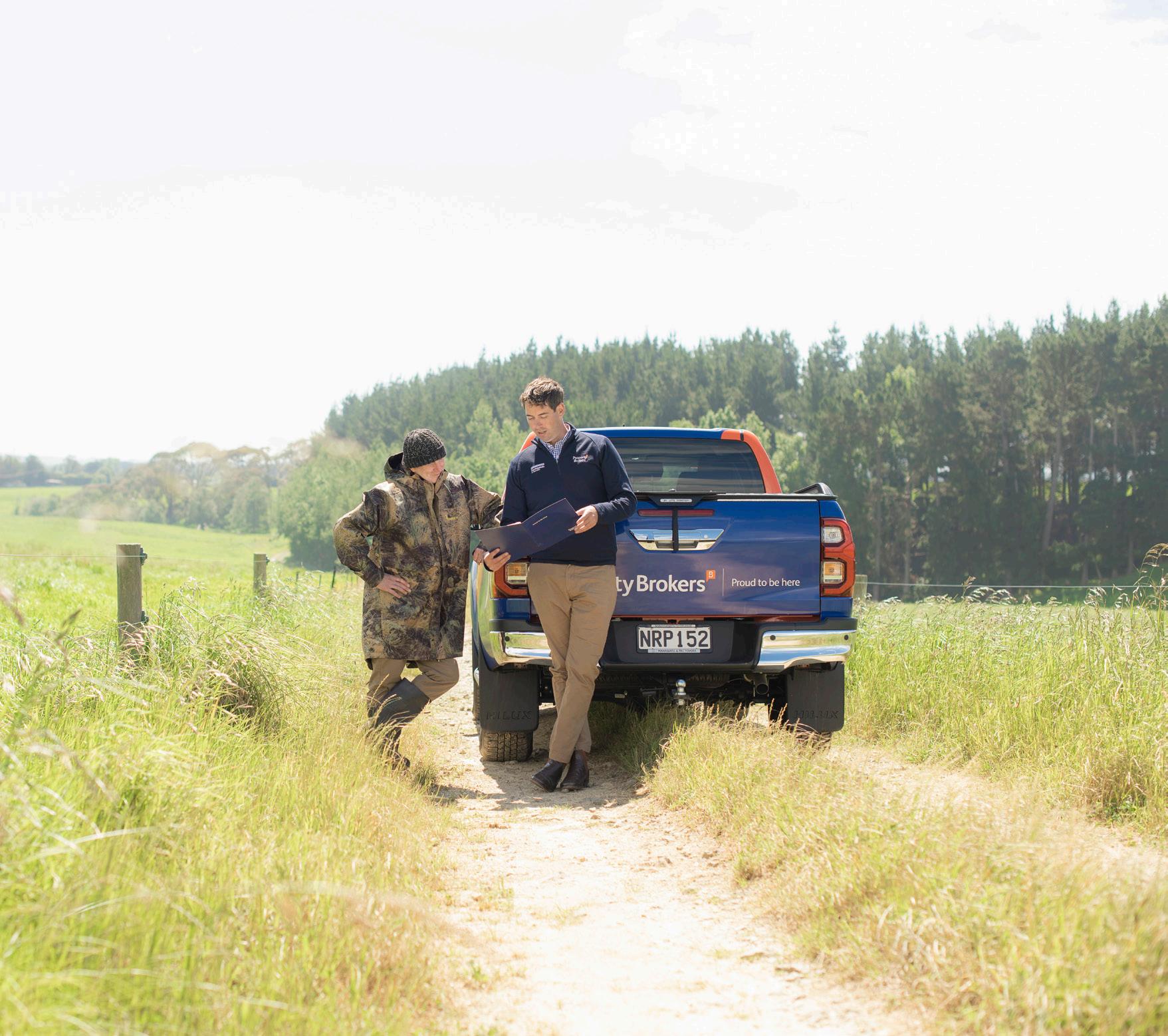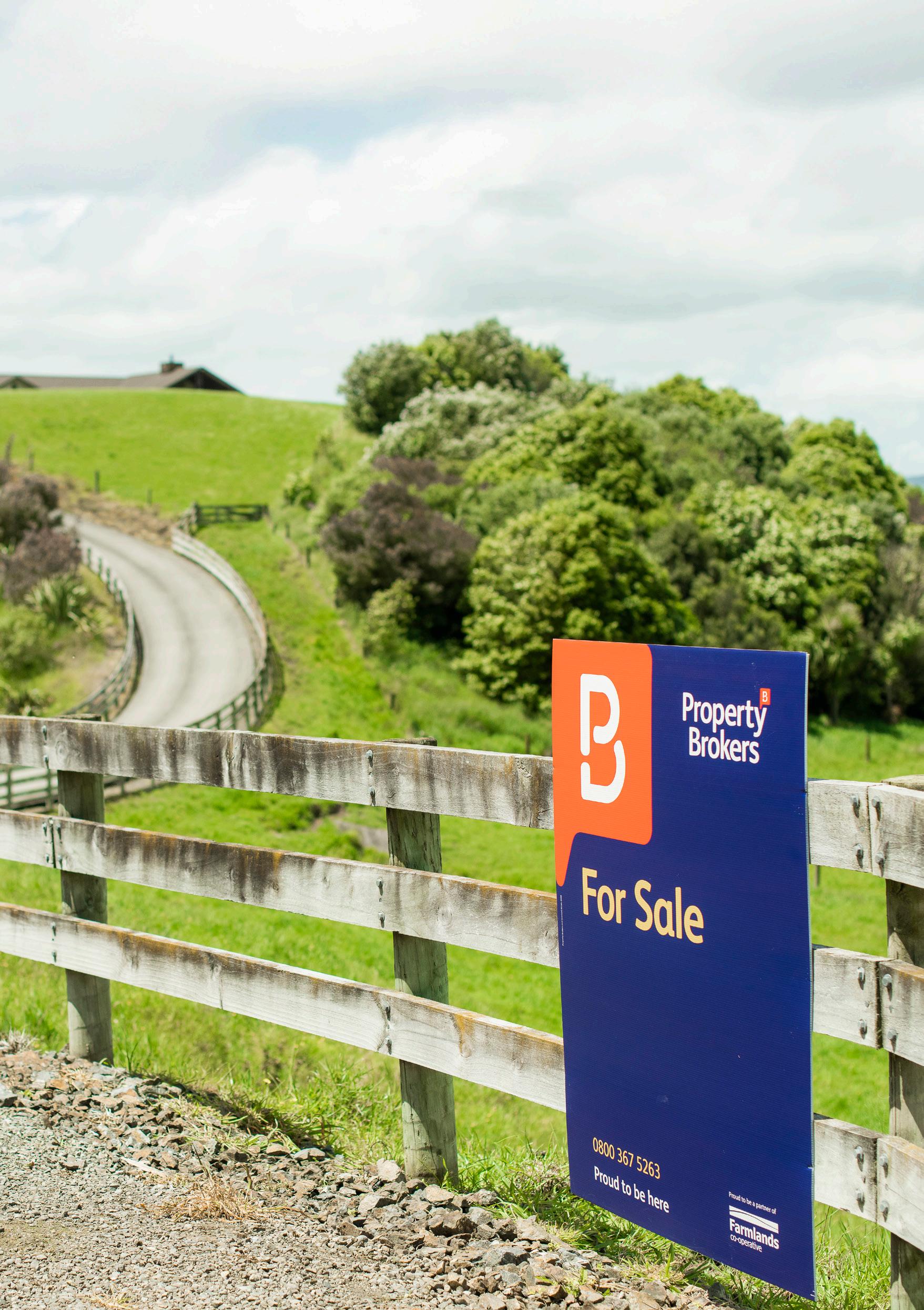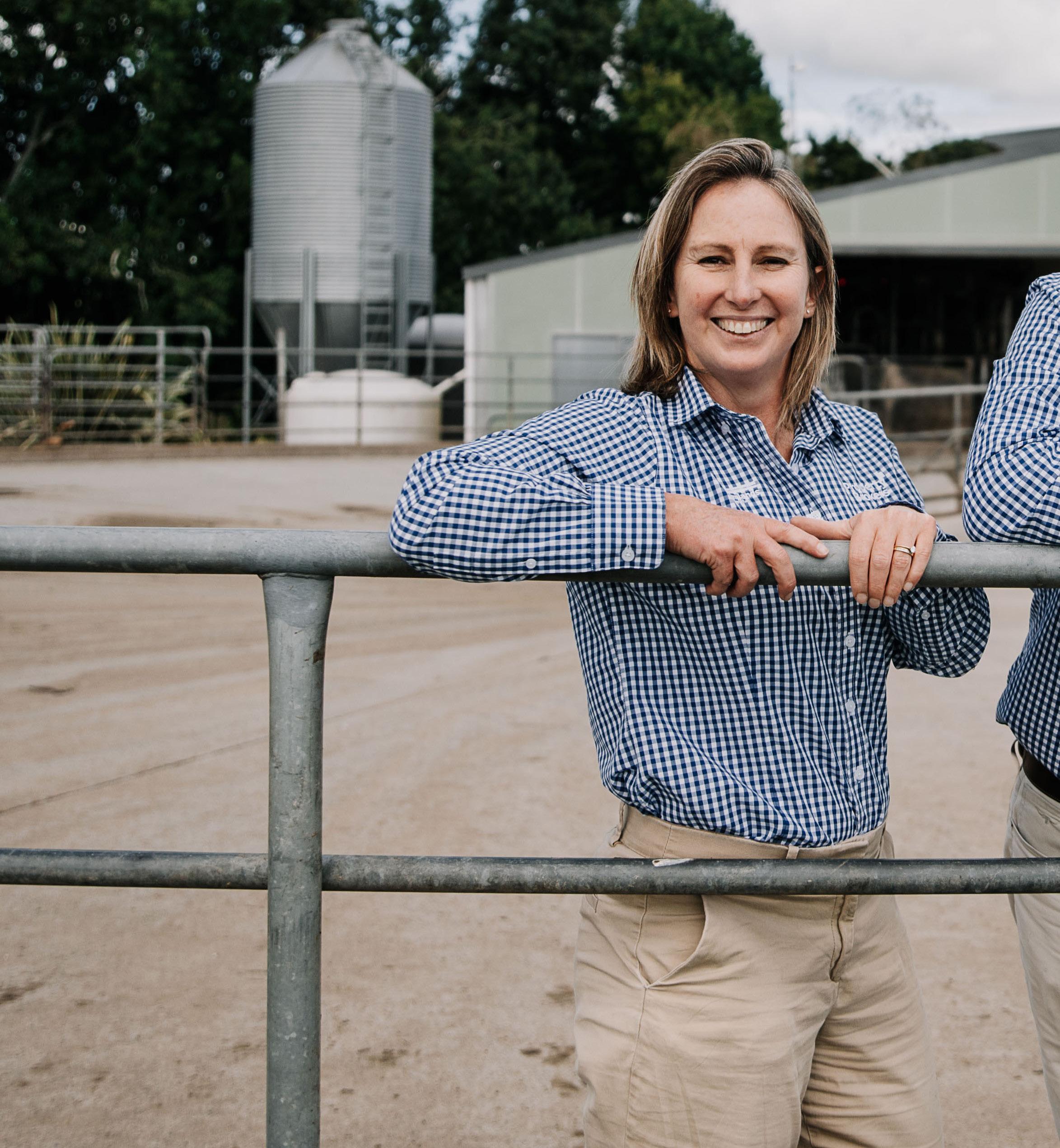Marketing options for selling your farm




Welcome to our top tips for selling your farm

This guide covers some of the common questions we are asked by those contemplating selling their farm. lt will not answer everything, as each property and situation is different, however we hope it will assist with some general advice and gives you some new options to consider for the decisions ahead.
Property Brokers has a proud provincial heart. We have grown in to a large successful New Zealand, family-owned business that operates throughout the provinces. When you work with us you can be guaranteed of a True Team of equally committed agents, marketing experts and support staff, from right across the country, working for you to get the best result.
lf you would like to talk to one of our rural agents about the current market or to answer any questions you may have about selling your farm, please call your nearest Property Brokers branch today – 0508 4 PB RURAL.
Conrad Wilkshire General Manager – Rural

Farm sales are relatively evenly spread throughout the year.
The diagram shows the seasonal timing of farm sales completed around the country based on sale date (when unconditional) for the past decade. This is for all pastoral and arable farm types and excludes the likes of forestry sales that are not seasonally influenced.
Typically, the busiest season for new dairy farms coming on the market is spring, consistently followed by all other farm types being listed in the summer and autumn seasons.
Some will take more time to sell, contributing to the large autumn sale numbers, as deals are concluded before winter.
Selling a farm will be the largest financial transaction most people will ever undertake; therefore, it makes sense to choose a company and rural consultant that will do the best job for you to achieve a premium price, rather than someone you may know who works in real estate. Here are a few things to consider when selecting a real estate company and sales consultant to sell your farm:
What is the track record of the real estate company?
What is the reputation of the company both in the rural sector and the real estate market in general. Is the company adequately resourced towards the rural market to support the needs of their sales consultant looking after your property, and do they have sufficient local knowledge of your region?
What is the sales consultants track record?
Ask your potential sales consultant what they have sold in recent times so you can assess whether they have the experience and professionalism to direct toward your property. All salespeople should be able to provide testimonials for you to view as proof of their previous sales, and service levels achieved with their satisfied customers.
Enthusiasm plays a big part to as a motivated, organised person with “less runs on the board” may be more effective than someone with 15 years of experience doing very little.

How many sales consultants are there in the company?
Rural buyers often look at multiple properties over a wide area before deciding on a property to purchase. For the best results, ensure that the company you choose to work with has a strong network of rural sales consultants and specialists throughout the country that can refer more potential buyers to your property.
What market share does the company have?
Look at how many properties the company has sold, both locally and nationally, in comparison to its competition. This information will provide some measure as to how effective the company and its sales consultants are in converting words into action and how efficiently and quickly they can sell your farm.
An Auction is a transparent method of sale that has potential to generate real competition between purchasers.
Selling by Auction places a timeframe around the sales process (typically 4-6 weeks), giving buyers a set date to work their due diligence to. The seller determines the terms and conditions of sale including the settlement date under which the property is to be sold.
When a property is sold at Auction, the sale is unconditional with a 10% deposit paid on the day.
Selling by tender places a timeframe around the process (typically 4-6 weeks), giving buyers a set date to work their due diligence to. After closing, tenders can remain open for a pre-determined timeframe allowing the owner to consider offers under less time pressure.
While the owner sets out the terms and conditions in the tender document, it does allow buyers to add conditions to their offer. Tenders are useful on complex sales that may involve various parcels of land and therefore multiple options.
Offers Closing Date or Deadline Sale Treaty
Selling by offers closing date or deadline sale is a less formal process than with a tender with no pre-determined timeframe for offers to stay open after closing. These sales methods have a similar timeframe structure to a tender, however offers can potentially be considered by the seller at any time.
A point to note here is that the potential buyer can withdraw their offer at any time prior to it being accepted.
By placing a fixed price on the property, buyers are able to make conditional and unconditional offers at any time with no time pressure on sellers or purchasers. This is a benefit to potential buyers as they can see the sellers expectations from the outset.
Determining the correct pricing of the property from the outset is critical during this process to avoid the property becoming stale or selling for a low amount.

An Auction is a transparent method of sale that has potential to generate real competition between purchasers.
The rural sales consultant you choose to sell your farm will ask you to sign an agency agreement. An agency agreement is a legally binding contract and there are two options to choose from when selling, a Sole Agency Agreement or a General Agency Agreement. The key differences between these two are:
A Sole Agency Agreement is where you contract one company to manage the sale of your property. The appointed salesperson/company will deal with the complete sale process including marketing, property inspections, and liaising with your lawyer and accountant to put together the Sale & Purchase Agreement (or tender / auction documents). They will also keep you informed of progress with regular updates, negotiate with buyers on your behalf and follow the transaction through to sale and settlement.
A General Agency Agreement gives more than one real estate company the right to market your property and you will be asked to sign an agreement with each different company. This agreement leads to various companies and salespeople completing the various activities described above and can dilute the responsibility and accountability of the sales process.
Under a Sole Agency Agreement one salesperson/company will be fully responsible for your property and accountable to you to ensure the process is handled as professionally as possible. You will have one point of contact to keep you informed of progress rather than multiple contacts if you sign a General Agency Agreement.

You never get a second chance to make a first impression, so giving attention to a few minor details on the farm could make all the difference to prospective purchasers come sale time. Here are a few general guidelines on what you can do to prepare your farm for sale.
Make sure you don’t overspend
Be careful how much you spend on preparing your farm for sale, as some things may not add enough value as others. Put together a priority list and only do the top few things that will increase the value with little effort and budget. Your sales consultant should be able to guide you through this process and point out the ‘quick wins’ that will make a difference come sale time.
Key items to give attention to are ensuring all fences are in good condition and not needing repair, all farm facilities and implement sheds are tidy and in working order, and all paddocks are tidy and mown.
Determine how much time you have
The lead time before the property is to be on the market will dictate what is practical to do; e.g. metaling and grading the front drive might only take an afternoon whereas painting the farm buildings is a longer project.
Get someone else to take a look
lf you have lived on the property for a long time, have someone else have a look around as sometimes familiarity stops us seeing things others may see straight away. ldeally this would be your sales consultant whose experience may spot things; however, any trusted set of fresh eyes is better than none.

Before signing a sale and purchase agreement for your farm, you must ensure you’ve done everything reasonable to let potential buyers know it’s for sale. A key part of that is great marketing. The scale of your marketing campaign will depend on the type and size of your property, but there are some essential elements that every successful campaign should include.
When you list your property with us, we list it on leading industry websites; pb.co.nz, Property Brokers agent websites, OneRoof, Trademe, homes.co.nz, leadingre.com and hougarden.
To reach the widest range of potential buyers, online advertising is essential. Our goal is to showcase your property to the target market wherever they are. By leveraging the Google network, we can advertise on nearly any website, and our exclusive rates on sites such as stuff. co.nz, nzherald.co.nz and metservice.com, ensuring you get the best value for your investment.
Radio
Rural communities are highly engaged with local radio, making it an effective way to reach potential buyers who rely on it for news, updates, and entertainment.
Social media is a crucial part of the marketing strategy, with Facebook alone reaching over 2 million active users in NZ. Its reach into rural markets is substantial, particularly among key decision-makers. We can advertise your property through advanced targeting on social media channels like Facebook, Instagram, LinkedIn, YouTube, TikTok, and X.
TV
TV is no longer reserved for big budgets and national reach. With digital TV, you can run targeted campaigns in local markets, focusing on rural audiences.
Property imagery
The key to marketing your property effectively lies in showcasing it well. There are many options, from professional photography to drone footage, video tours, floorplans, and virtual renderings.
Once your property goes live in our system, it instantly reaches our local, national, and international databases, maximising buyer interest. We reach out to local buyers, investors, and businesses to let them know about your listing. Our sales team and network partners also include your property in regular email marketing campaigns sent to their extensive databases.
Property Brokers has built strong relationships with rural professionals and business contacts. We inform this network when your property hits the market, making sure anyone discussing potential acquisitions is well aware of your listing.
We provide all the marketing materials needed to support your farm sale –brochures, information memorandums, DLE’s, flyers, info packs, window cards, digital displays, and letters.
Ensuring your farm has strong exposure in local and national publications is crucial. A well-crafted print media campaign targeting publications that reach your specific market is essential.
Does your property have a unique story to share? Our communications team can craft an editorial with the potential to catch the eye of local and national news outlets. We’ll collaborate with reporters and media agencies to maximise this valuable source of online and print exposure.
lnformation memorandum booklets
A professional and informative booklet, designed specifically for your farm, is an important tool in the selling process. It gives prospective buyers all the necessary information they need to make some fundamental decisions. These comprehensive booklets will be designed for your property, and will include detailed information on all facets of your farm, photos, titles, descriptions and all other pertinent information.
Signage
Eye-catching signage makes sure everyone driving by knows your property is up for sale. It helps spread the word among locals and taps into the word-of-mouth network to create a local buzz. Plus, it catches the attention of out-of-towners interested in relocating.

As well as working with your chosen real estate company and lead sales consultant, you may need to talk to other key advisors and professionals to discuss certain aspects of your sales plan. Here are some key questions for these people.
Lawyers
Are there any loose ends from previous and/or family transactions or titles that need to be tidied up before sale?
Accountants
Would a certain settlement date be more tax effective for me?
Rural Bankers
Would a particular settlement date be beneficial to avoid fixed rate loan penalties?
Dairy Company
How can I gather my farm information?
Environmental Consultants
Is my farm compliant under the current regulations for my area? e.g. intensive grazing, farm environment plan, farming consents and district planning.
Farm Consultants
What can l do to make the process smoother at settlement? e.g. supplementary feed to be left on the farm and herd drying off dates.
Irrigation scheme/company
Is my farm currently compliant under current regulations, and who controls my farm nutrient loading?
Valuation and/or Forestry Consultants
Are there any assets or forestry blocks within the farm business that need to be valued before sale? Your accountant will also be able to advise on this.
Stock Agents
Are there certain timings to consider with the sale of capital stock?
For those looking at their property options, and contemplating taking their rural property to market, it’s worth doing the due diligence ahead of time, prior to listing. Decide on your preferred rural sales consultant early in the process, a qualified consultant can really help clarify the marketing objectives and the options available to you. The rural market continues to strengthen and as more listing come to market, you want your property to stand out from the rest.
There are some baseline requirements, these include:
1. Walk the property with your real estate consultant and work up a check list of fixes required to present your property in the best possible light when you go to market
2. What environmental planning has been undertaken? This includes regulatory compliance and all operating consents renewal dates and any environmental mitigation work recently carried out
3. Bring your trusted advisers in on your thinking early, particularly your accountant, lawyer, and farm adviser
4. lmportant business information requirements include:
• Farm production data
• Stock reconciliations for the last 3 years
• Key operational costs
• Physical farm information such as farm maps, soil types and fertiliser records
Farm forestry and associated carbon opportunities are big topics these days, getting advice on this is paramount.
The single most important guide is to get our specialist consultants involved, sooner rather than later. Anticipating buyer questions ahead of time, not only builds confidence in the property and the marketing of it, but it also sets you apart from the rest. A well organised marketing programme is a great assist to your trusted advisers too, as they guide and support you through the sales process. Markets are based on confidence, a great farm matched to a best-in-class sales and marketing program continues to be proven a winning formula at Property Brokers, and our strategic partnership with Farmlands


The Property Brokers and Farmlands partnership means great things for provincial real estate. Together, our combined strengths complement each other to create more opportunity for customers and Shareholders across provincial New Zealand.
